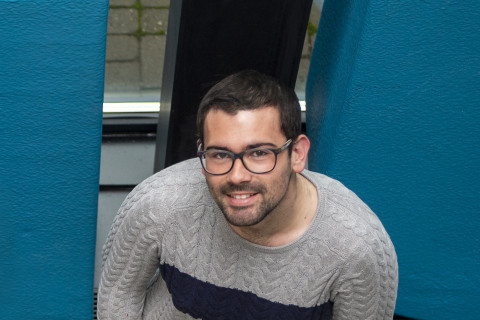Gonzalo Maestro Paredes is a second-year Linguistic Data Sciences major, who moved all the way from sunny Spain up north to Finland to pursue his passion in linguistics. Why was Finland Gonzalo’s number one choice for studies? How did his studies at UEF spark a passion for endangered languages?
- I had studied my bachelor’s degree in Spanish language and linguistics. I worked for a few years teaching Spanish as a second language, but realized I was more interested in linguistics than teaching languages. That’s when I started to look for opportunities to further pursue my studies in the field, Gonzalo says.
Curiosity towards the education system drew eyes to Finland
Gonzalo started looking for opportunities to pursue his linguistic studies further. He was interested in studying for example emotional linguistics and speech intonation.
- Text messages are one of the most common ways to communicate nowadays. As we cannot add intonation to them, we use emojis, gifs, stickers, and such. I wanted to learn more about how technology matches modern demands and how humans can interact with computers and vice versa, Gonzalo says.
One of the things that made Gonzalo dig deeper into UEF and what it has to offer was language technology, one of the two sub-programs you can choose to specialize in at the university. Language technology combined with general linguistics turned out to be the combination Gonzalo had been looking for.
- Finland was actually my number one option to study as I was very curious about the education system here. As I looked into different universities, I found UEF to be one of the best in Europe. I thought it would be interesting to study here, so I decided to apply, Gonzalo remembers.
Appreciating collaboration opportunities and support for students
Gonzalo appreciates the multidisciplinary possibilities that allow students to shape their master’s degree into something that suits their own interests and career plans in the best way. Gonzalo’s studies have included for example coding to further understand the technical side of linguistic possibilities.
- One thing that is quite unique at UEF is all the technology that students have at their use. The university has great facilities, language labs, programs, and software to study technological linguistics. Everything necessary for getting the most out of your studies is provided here for students. The facilities are open 24/7, so you can come and use the equipment any time you want with your student pass, Gonzalo says.
He also wants to note how helpful and supporting the professors at UEF are. They are easy to reach and take initiative on inviting students to follow and participate in research projects where it’s possible to get good insight on practical work to support topics learned from books in the classroom.
- Not only is there a lot to learn from the teachers here at UEF, but there is also the possible to take classes from other universities thanks UEF’s collaboration with other schools. I feel that UEF truly understands students and wants to help us succeed, Gonzalo explains.
Studies sparked a passion for endangered languages
When starting his studies, Gonzalo was interested mainly in emotional linguistics, but as his studies progressed, he became more and more fascinated with the different aspects of languages and endangered languages.
- Right now, I’m focusing on low-resource linguistics, for example how a certain letter sounds in different languages. For my thesis I’m doing a phonetical analysis on a low-resource language that is spoken by only 4, 000 speakers at the border of Spain and Portugal. The language is not recognized by the government and not many people can even write it, Gonzalo says.
Gonzalo is studying how the language sounds and comparing it to other languages in his research. His thesis study requires using different software and programs to research how the language sounds and how it’s written. Gonzalo feels that his background in education in Spanish has been helpful during the process.
- Documentary linguistics was not what I was interested in when I started, but I was inspired here by a professor studying Russian languages. I found it interesting how we can protect endangered languages, prevent them from dying and remove bad stigma. The Karelian language is a good example of this, but I decided to go with a language closer to where I personally come from, Gonzalo says.
Grammar, phonetics, syntax, and morphology have not been formally studied and documented in various languages, and there is usually very little knowledge about these languages. In addition to endangered languages, these languages also include low-resource languages that Gonzalo is interested in learning more about.
Plans to stay in Finland after graduating
Gonzalo was surprised by how international Joensuu is as a city: a third of the people living in the city are students and many of them represent different nationalities. He had originally thought about coming to Finland only for his master’s degree, but during his time at UEF, his plans have changed.
- I would never have thought about this specific type of linguistics without UEF. The university offers lots of possibilities and I might pursue my PhD here in the future. Studying here has made me very aware of the problems endangered languages face and I want to do my part in trying to save them, Gonzalo says.
Gonzalo has three words for someone thinking about applying to UEF’s Linguistic Data Sciences program: just do it!
- You might be thinking is it going to be what you’re expecting. The basic program combines many aspects of linguistics, and you are very free to choose your studies. UEF offers wide studies in one master: you’ll learn lots from basics to how robots talk with synthesis and many things in between. Maybe you’ll even find your passion during you studies like I did, Gonzalo says with a smile.



